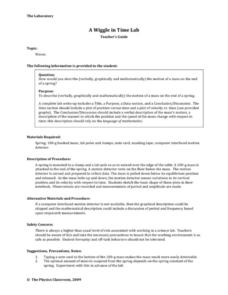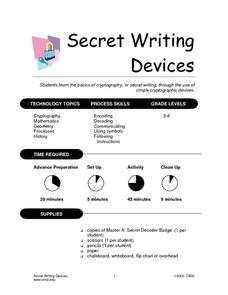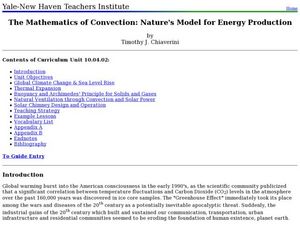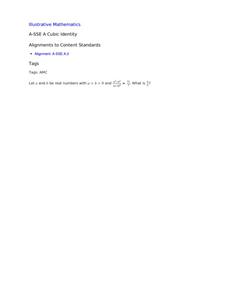Virginia Department of Education
Types of Variations
Scholars determine how two quantities vary with respect to each other. They complete a fill-in-the-blank activity by stating whether the entities vary directly, inversely, or jointly, create equations that match different variations, and...
EngageNY
Estimating Digits in a Quotient
Boiling down any division problem to a one-digit divisor problem sure makes estimation easy. The lesson shows how to estimate division problems by using place value understanding and basic arithmetic facts to simplify the division. Some...
Alabama Learning Exchange
Writing Equations for Parallel Lines
Acquaint your class with the concept of parallel lines. Learners watch a PowerPoint presentation about how to write equations of parallel lines. Their understanding of linear equations and slope is taken a step further by the...
Mathematics Assessment Project
Representing 3-D Objects in 2-D
How does the shape of the surface of water in a container change as water leaks out? After tackling this question, learners take part in a similar activity with more complex figures.
Physics Classroom
A Wiggle in Time Lab
Though an alternative method is suggested, the best way to carry out this investigation is with the use of a computer-interfaced motion detector. Physics fanatics hang a mass on the end of a spring and analyze its motion verbally,...
Ahisma Summer Institute
The Power of One - Math in a Different Angle
In this 2-day lesson focused on exponents, middle schoolers will cross the curriculum by engaging in science, history and language arts activities. Exponential growth will be explored using grains of rice on a chess board. Exponential...
Curated OER
Secret Writing Devices
Elementary and middle schoolers explore the world of secret writing, otherwise known as cryptography. After an interesting introduction to the activity, learners utilize a decoder badge which uses the St. Cyr cipher - which is a cipher...
Curated OER
The Mathematics of Convection: Nature's Model for Energy Production
High schoolers conduct a series of experiments to investigate density, buoyancy and climate. In this math lesson plan, pupils design and build a hot air balloon to demonstrate convection. They research and write a paper about solar...
EngageNY
Read Expressions in Which Letters Stand for Numbers
Pencil in the resource on writing verbal phrases into your lesson plans. The 15th installment of a 36-part module has scholars write verbal phases for algebraic expressions. They complete a set of problems to solidify this skill.
Curated OER
Babylonian Mathematics I
Learners examine a Babylonian clay tablet and the mathematics found on it as a catalyst to investigate a variety of mathematical ideas. They work with prime numbers, classify numbers as whole, integer, rational, or irrational and use...
EngageNY
Writing and Interpreting Inequality Statements Involving Rational Numbers
Statements often have multiple interpretations — but not these inequality statements. Scholars compare rational numbers and write inequality statements symbolically. The lesson includes problems that require comparing three numbers.
EngageNY
Linear Systems in Three Variables
Put all that algebra learning to use! Using algebraic strategies, learners solve three-variable systems. They then use the three-variable systems to write a quadratic equation given three points on the parabola.
EngageNY
Multiplication of Numbers in Exponential Form
Develop a solid understanding of multiplication and division properties of exponents. Individuals expand exponential terms to discover the patterns and create the properties in the second installment in a series of 15. The activity...
Virginia Department of Education
Logic and Conditional Statements
If there is a conditional statement, then there is a hypothesis and conclusion. Pupils learn how to identify the parts of conditional statements. Class members continue to work with conditional statements and rewrite them in their many...
Texas Education Agency (TEA)
Geometry in Architecture #1
Discover how to analyze architecture from a geometric standpoint. The fourth installment of an 11-part unit on architecture first provides a presentation on axis, balance, basic form, formal, pattern, proportion, symmetry, and tripartite...
Curated OER
Deal Me In
Middle schoolers study the components of a deck of cards and conduct an initial experiment in the probability of drawing various types of cards from a deck. They play two rounds of poker to discover the probability of drawing several...
Kent State University
How Does that Work?
Sixth and seventh graders explore algebra word problems. They work with a partner to solve word problems distributed by e-mail. Learners simplify mathematical expressions following a "think aloud" algebra strategy modeled by the teacher....
EngageNY
From Ratio Tables to Equations Using the Value of a Ratio
Use the value of a ratio to set up equations. The teacher leads a discussion on determining equations from ratio tables in the 13th portion of a 29-part series. Pupils determine which of two equations to use to find the solution....
Illustrative Mathematics
The Djinni’s Offer
The djinni in this resource offers gold coins. Learners use the properties of exponents to make their decision as one offer increases exponentially. This makes a great group project. As the commentary suggests, start by having groups...
EngageNY
The Graph of the Natural Logarithm Function
If two is company and three's a crowd, then what's e? Scholars observe how changes in the base affect the graph of a logarithmic function. They then graph the natural logarithm function and learn that all logarithmic functions can be...
EngageNY
Constant Rate
Two-variable equations can express a constant rate situation. The lesson presents several constant rate problems. Pupils use the stated constant rate to create a linear equation, find values in a table, and graph the points. The resource...
Illustrative Mathematics
Fruit Salad
Playing with values in this fruit salad problem allows learners to find out how many cherries were mixed in. Your middle schoolers can organize their thoughts in a chart before going into the equation. Eigth graders can skip the chart...
Illustrative Mathematics
Gotham City Taxis
Taxi! Have your travelers figure out how far they can go in a taxi for $10.00. They must account for the mileage rate and tip in their calculation. They can set up a table or make an equation to solve for the exact mileage they can...
Illustrative Mathematics
An Integer Identity
Challenge algebra learners to use the difference of cubes to solve this problem. Once your charges have taken out the factor (a - b), combined the like terms and set them equal to zero, the problem becomes a factorable quadratic...

























